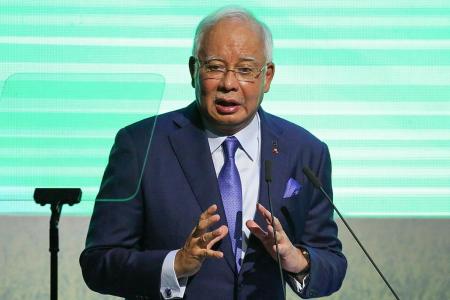Asean to express 'grave concern' over weapons tests
North Korean foreign minister asks for support in row with US but regional grouping will have none of it
MANILA: South-east Asian countries yesterday expressed "grave concern" over North Korea's nuclear weapons tests and ballistic missile launches, despite Pyongyang's appeal for support in its tense stand-off with the US.
In a rare move, North Korean Foreign Minister Ri Yong Ho wrote to Asean's secretary general appealing for backing in its row with the US to prevent what it warned could be a "nuclear holocaust".
But regional foreign ministers meeting in Manila yesterday issued a stand-alone statement criticising North Korea.
"Asean expresses its grave concern over the escalation of tension in the Korean Peninsula, including the DPRK's two nuclear tests in 2016 and subsequent ballistic missile launches," said the statement.
TENSIONS
The bloc "is mindful that instability in the Korean Peninsula seriously impacts the region and beyond".
Tensions have soared in the region in recent weeks in the wake of a series of North Korean missile tests and tough rhetoric from the administration of President Donald Trump on the isolated nation's rogue weapons programme.

The Asean ministers "strongly" urged North Korea "to comply fully" with relevant UN Security Council resolutions and international laws aimed at curbing its nuclear programme, and called for the resumption of negotiations on the issue.
The North quit six-nation talks aimed at ending its nuclear ambitions in 2009.
Asean, however, also urged "all parties concerned to exercise self-restraint in order to de-escalate the tension and refrain from actions that may aggravate the situation".
Diplomats in Manila said the other parties apparently refers to the US and regional powers China, Japan and South Korea - all key strategic players in the region.
South-east Asian leaders are then due to meet today, when the situation on the peninsula is also expected to be discussed.
In his letter to Asean, North Korean foreign minister Ri warned the situation on the Korean Peninsula was "reaching the brink of war" because of Washington's actions. Mr Ri had urged the bloc's chief to inform the group's foreign ministers "about the grave situation" on the peninsula "and give them a proper proposal", while criticising at length US-South Korean military exercises. - AFP
Najib: Growth inequality will lead to violent extremism
MANILA: Malaysian Prime Minister Najib Razak yesterday warned that South-east Asian countries needed to ensure their economic growth was inclusive, or risk marginalised populations turning to violent extremism or even overturning political systems.
Speaking at an event for entrepreneurs during the Asean summit in Manila, Mr Najib said the region was posting strong growth that could see it become the world's fourth-largest economy, but that growth needed to be equitable.
"We do not want our citizens to be marginalised in the age of extremism and radicalisation," he said. "We know that those who see no hope in their own societies are more prone to the siren calls of terrorists who can and will exploit their vulnerability and fill them with their lies."
Extremism is expected to be high on the agenda during this week's meetings, with fears for Indonesia, Malaysia and the Philippines about piracy and the rising threat of ISIS (Islamic State in Iraq and Syria).
Of particular concern is the ease with which militants can acquire weapons, seek refuge with existing rebel groups and move between the many islands between the three countries.
50TH YEAR
Mr Najib lauded the success of Asean, which is celebrating its 50th anniversary this year, in expanding its collective GDP to about US$2.7 trillion (S$3.8 trillion) now, from $87 billion four decades ago.
Asean has 10 members: Thailand, Myanmar, Laos, Cambodia, Vietnam, Singapore, Brunei, Malaysia, Indonesia and the Philippines.
He warned that economic disparity was dangerous at a political level too, fuelling anger and populism that was causing problem in Western Europe.
"The neglected underclass of those who felt left behind by economic growth, prosperity and globalisation can overturn elections and political systems," he said.
Economists frequently point out huge income gaps among the 620 million people of South-east Asia, a region that has one of the world's largest concentrations of billionaires, according to Forbes Magazine.
Mr Najib said awareness of Asean needed to be better promoted among its citizens to "make it feel real, relevant and tangible".
Trade integration was lagging, he said, with too many trade tariffs still in existence.
Their removal, and harmonised customs standards, needed to be "vigorously pursued", he said.
Philippines Vice-President Leni Robredo echoed PM Najib's call for leaders to pay more attention to their poor.
She said: "For many years, many thought income inequality was alright. But the voiceless and the powerless are now raring to be heard, and with technology and social media, their frustrations are being felt on a global scale." - REUTERS
Get The New Paper on your phone with the free TNP app. Download from the Apple App Store or Google Play Store now



